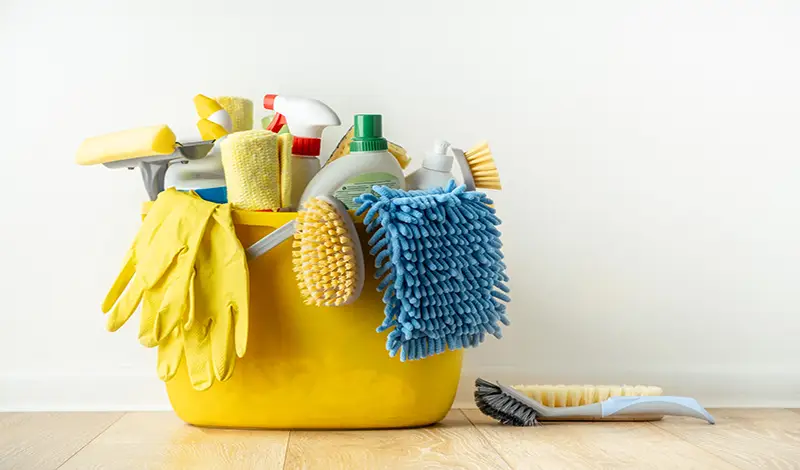Creating a Cleaning Schedule for Your Home
Published on May 10, 2024 | 5 Minute read

Melanie
Ortiz Reyes
Content Specialist
Keeping a clean and organized home not only enhances comfort and aesthetics but also promotes a healthier and more productive living environment. However, with busy schedules and multiple responsibilities, it can be challenging to stay on top of household chores consistently. The key to success lies in creating a structured cleaning schedule tailored to your lifestyle and home's needs.
Assess Your Home's Cleaning Needs and Determine Cleaning Frequency
The first step in creating a cleaning schedule is to assess your home's specific cleaning needs. Consider factors such as the size of your home, number of rooms, types of flooring, presence of pets or children, frequency of use in different areas, and any specific cleaning challenges like high-traffic areas, dust accumulation, pet hair, etc. This assessment will guide you in allocating time and tasks effectively.
Identify tasks that require daily, weekly, bi-weekly, or monthly attention based on priority and practicality. For example, daily tasks may include making beds, washing dishes, and tidying common areas. Weekly tasks may involve vacuuming, mopping floors, cleaning bathrooms, and changing linens. Bi-weekly or monthly tasks can include deep cleaning tasks such as dusting blinds, washing windows, cleaning appliances, and decluttering storage spaces.

Create a Master Cleaning Checklist and Allocate Time Slots
Develop a comprehensive checklist of all cleaning tasks categorized by frequency (daily, weekly, bi-weekly, monthly). Include specific tasks for each room or area of your home, such as kitchen, bathrooms, bedrooms, living spaces, and outdoor areas if applicable. Having a visual reference of tasks ensures nothing is overlooked and helps you stay organized.
Review your weekly schedule and allocate dedicated time slots for cleaning tasks based on your availability and energy levels. Consider your work schedule, family commitments, and other activities to find time blocks that align with your routine. Breaking tasks into manageable chunks throughout the week reduces overwhelm and ensures consistent progress.
Prioritize High-Traffic Areas and Incorporate Daily Maintenance Habits
Focus on cleaning and maintaining high-traffic areas such as entryways, kitchens, and bathrooms more frequently. These areas tend to accumulate dirt, germs, and clutter faster and have a significant impact on overall cleanliness and hygiene.
In addition to scheduled cleaning tasks, incorporate daily maintenance habits to keep your home tidy effortlessly. Encourage family members to clean up after themselves, such as putting away toys, clothes, and dishes. Establishing simple routines like wiping down kitchen counters after meals or doing a quick tidy-up before bedtime can prevent clutter from accumulating.

Delegate Responsibilities and Use Efficient Cleaning Techniques and Products
Involve family members or housemates in the cleaning process by assigning age-appropriate tasks. Create a chore chart or schedule rotations for tasks such as vacuuming, dusting, laundry, and yard work. Sharing responsibilities fosters teamwork, teaches valuable life skills, and lightens the cleaning load for everyone.
Optimize your cleaning routine by using efficient cleaning techniques and suitable products for different surfaces and areas. Invest in quality cleaning tools such as microfiber cloths, vacuum cleaners with attachments for various surfaces, eco-friendly multipurpose cleaners, and organizers to streamline storage spaces. Research proper cleaning methods for specific tasks to achieve optimal results with minimal effort.
Schedule Seasonal Deep Cleaning Sessions and be Flexible
Plan seasonal or quarterly deep cleaning sessions to tackle areas that may require more intensive attention. This can include cleaning behind appliances, organizing closets and cabinets, purging clutter, steam cleaning carpets, washing curtains, and refreshing upholstery. Incorporating deep cleaning into your schedule prevents buildup and maintains a healthier indoor environment.
Stay flexible with your cleaning schedule and be prepared to adapt based on changing circumstances or priorities. Life events, guests, holidays, or unexpected commitments may require adjustments to your cleaning routine. Having a flexible mindset allows you to stay on track without feeling overwhelmed by unforeseen changes.

Seek Professional Help When Needed and Embrace the Benefits of a Clean Home
For complex or time-consuming tasks such as carpet cleaning, upholstery cleaning, deep grout cleaning, or exterior maintenance, consider hiring professional cleaning services periodically. Professional cleaners have the expertise, tools, and products to tackle challenging tasks efficiently, saving you time and ensuring thorough results.
Finally, embrace the numerous benefits of a clean and organized home, including improved physical and mental well-being, enhanced productivity and focus, reduced stress, pride in your living space, and a welcoming environment for family and guests. Consistent cleaning habits contribute to a happier and healthier lifestyle for everyone in your household.
Remember to celebrate your cleaning milestones and consistency in maintaining a clean home. Reward yourself and your household for meeting cleaning goals, staying organized, and working together as a team. Positive reinforcement reinforces good habits and motivates continued effort in keeping your home a welcoming haven.
Creating a structured cleaning schedule tailored to your home's needs and your lifestyle is key to maintaining a tidy and organized living space effortlessly. Consistency, teamwork, and a positive mindset are the cornerstones of a successful cleaning routine that supports your well-being and enjoyment of your home.